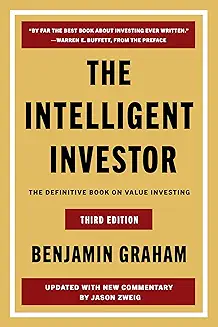Timeless Lessons from the Classic Book by Benjamin Graham
By Benjamin Graham (with commentary by Jason Zweig)
Originally published in 1949, The Intelligent Investor remains one of the most respected and recommended books in the world of investing. Often called the “bible of value investing,” this book was written by Benjamin Graham, the mentor of Warren Buffett, and it continues to shape how smart investors approach the stock market.
In this article, we’ll break down the core concepts, timeless strategies, and practical lessons from this influential book—so you can start thinking like an intelligent investor, even if you’re a complete beginner.
Why Is This Book So Important?
Warren Buffett calls The Intelligent Investor “by far the best book on investing ever written.” But what makes it so valuable?
Because it doesn’t teach you to beat the market—it teaches you how not to lose. Graham’s philosophy is all about minimizing risk, thinking long-term, and investing with discipline, not emotion.
Whether you’re new to investing or have years of experience, the principles in this book are designed to help you preserve your capital and build wealth wisely.
1. What Is an “Intelligent Investor”?
An intelligent investor isn’t necessarily someone with a finance degree or access to exclusive information. According to Graham, it’s someone who:
- Thinks rationally, not emotionally
- Focuses on long-term results, not quick gains
- Avoids speculation and hype
- Stays disciplined, even during market chaos
- Understands the difference between investing and gambling
In short, being intelligent means being patient, cautious, and informed.
2. Defensive vs. Enterprising Investors
Graham divides investors into two categories:
🛡 Defensive Investors:
- Prefer a hands-off approach
- Aim to preserve capital
- Invest in diversified, low-risk portfolios (e.g., index funds, blue-chip stocks, bonds)
- Don’t try to time the market
Perfect for those who want safety and steady returns with minimal effort.
🔍 Enterprising Investors:
- Willing to put in extra time and research
- Seek undervalued stocks (value investing)
- Aim for above-average returns
- Must avoid emotional decision-making and hype
Ideal for those who enjoy studying companies and are comfortable managing their own portfolios.
3. The Concept of “Margin of Safety”
This is one of the most powerful principles in the book.
“The essence of investment management is the management of risks, not the management of returns.” — Benjamin Graham
Margin of Safety means buying an investment at a price significantly below its true value—so even if things go wrong, you’re protected.
It’s like buying a $100 bill for $70. If you’re wrong, you still minimize loss. If you’re right, you gain.
This principle helps protect investors from market crashes, bad news, or poor judgment.
4. Mr. Market: A Lesson in Investor Psychology
Graham introduces the metaphor of “Mr. Market”—an imaginary business partner who shows up every day offering to buy or sell shares at different prices.
Sometimes he’s optimistic (overpriced offers), sometimes depressed (undervalued offers). The intelligent investor doesn’t follow his mood swings.
Instead, you:
- Ignore the noise
- Buy only when the price is right
- Remain patient
- Trust your analysis
This teaches you how to avoid panic-selling during dips or buying into hype during rallies.
5. Investing vs. Speculating
Graham is clear: investing is not gambling. Investing involves:
- Research
- Discipline
- Long-term thinking
- Rational expectations
Speculation, on the other hand, is guessing, chasing trends, or hoping for fast gains. The intelligent investor avoids speculation unless they fully understand the risks.
6. The Importance of Emotional Control
The book constantly reminds us that emotions are the biggest threat to financial success.
Common emotional mistakes:
- Buying because others are buying (FOMO)
- Selling in panic during downturns
- Overconfidence after small wins
- Chasing “hot stocks” without research
Successful investing requires emotional discipline, especially in uncertain markets.
7. Practical Portfolio Advice
For beginners, Graham suggests:
- 50% in stocks, 50% in bonds (adjustable based on market conditions)
- Stick to high-quality companies with solid fundamentals
- Avoid frequent trading or “timing the market”
- Rebalance your portfolio occasionally (e.g., once per year)
This keeps your risk manageable and helps avoid emotional overreactions.
Is It Still Relevant Today?
Absolutely. While some of the examples in the original book are dated, the core principles of value investing are timeless. Modern investors still apply Graham’s ideas to:
- Stock picking
- Portfolio building
- Risk management
- Long-term financial planning
Even Warren Buffett credits his success to applying Graham’s teachings—with patience, logic, and a cool head.
Final Thought: Wealth Comes From Wisdom, Not Luck
The Intelligent Investor is not a get-rich-quick book. It’s a blueprint for building wealth safely and responsibly, based on logic, research, and calm decision-making.
If you’re serious about investing—whether passively or actively—this book will challenge your thinking, strengthen your strategy, and help you make better decisions.
In a world full of financial noise, Benjamin Graham offers clarity, wisdom, and confidence. And that’s worth more than any stock tip.



